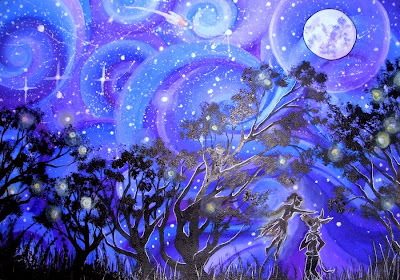First: I wanted to envision the aftermath of A Midsummer Night's Dream. In the main plot of Shakespeare's play, Lysander and Hermia want to marry, but Hermia has been promised to Demetrius whom she loathes. The problem is resolved with a fairy love spell: Demetrius is tricked into loving Helena, to whom he had previously been engaged and who still loves him. All ends happily, with Lysander marrying Hermia and Demetrius marrying Helena. But dear poet Willy, that's too cheap a fix! Demetrius can't just stay permanently tricked into love, happily ever after, can he? Midnight fairy magic always causes more problems than it solves, for that is the unbreakable law of fairies. (Just ask Susanna Clarke.)
Second: I wanted to explore a certain simplistic parody of Buddhism. Demetrius's love spell ends the next day. But his revenge is this: Hermia's child, Sage, is a philosopher baby who believes that non-existence is preferable to suffering. Since he disbelieves in the reality of an extended self, to determine whether life is worth living at any moment, Sage simply weighs up his total joy and suffering at that moment. As soon as his current suffering outweighs his current joy, he attempts to commit suicide, employing a sharp magic tusk he was born with for just that purpose. Hermia and Lysander must thus keep constant watch on Sage, physically pinning him down the moment he starts feeling frustrated or colicky.
Though drawn in starker colors, this is just the predicament confronting all parents when their children would rather cast away future interests than accept a little short-term suffering. Is there a rational argument that can convince someone to value the future, if they don't already? Sage and Lysander have a go at it, but Sage always wins. He is the better philosopher.
It's a piece of dark fantasy, verging on horror -- so if you don't enjoy that genre, stand warned.

That's beautiful, congratulations. I loved the bald philosophical head, and Lysander fleeing in all directions. (Incidentally, if you're interested in the relationship between narrator, reader and story, Ian McEwan's Atonement is a wonderful play on the function of narration. Can't recommend it highly enough.)
ReplyDeleteInteresting that you relate it to Buddhism. What struck me was how Sage sounds rather Daoist in some ways - the skepticism, the refusal to fear death - and yet so different in others. No acceptance of his situation, nor will he allow himself or anyone else to even define what his situation is. Made me realise how central time is to a lot of Daoist stories: all those ruminations on different life spans, and the time it takes to become skillful.
Also, as a panicky modern parent, it reminded me that whatever their faults, children never choose suicide. Failure to do homework isn't quite the same thing as plunging a blade into your chest!
Thanks for the kind comments, chinaphil! Sage doesn't have to be specifically Buddhist -- I agree that there's a bit of a Daoist tinge to him too or instead, and then also a calculating hedonism that's foreign to both mainstream Daoism and Buddhism. So he's his own weird mix.
ReplyDeleteI'll check out "Atonement". Thanks for the suggestion. I didn't mention it in the post, but of course you picked up the play between narrator and story, and Demetrius's attempt to tell the story without believing in the past.